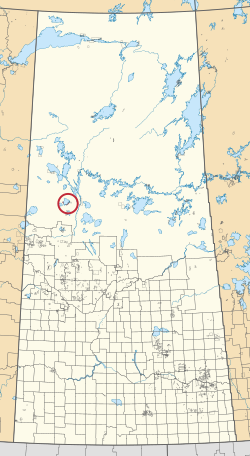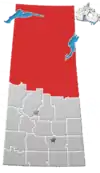Canoe Lake 165
Canoe Lake 165 is an Indian reserve of the Canoe Lake Cree First Nation in the boreal forest of northern Saskatchewan, Canada. Its location is on Canoe Lake approximately thirty miles west of Beauval, within the ancient hunting grounds of the Woodland Cree. In the 2016 Canadian Census, it recorded a population of 912 living in 250 of its 273 total private dwellings.[2] In the same year, its Community Well-Being index was calculated at 53 of 100, compared to 58.4 for the average First Nations community and 77.5 for the average non-Indigenous community.[3] The reserve includes the settlement of Canoe Narrows.
Canoe Lake 165 | |
|---|---|
| Canoe Lake Indian Reserve No. 165 | |
 Location in Saskatchewan | |
| Coordinates: 55°9′50″N 108°9′16″W | |
| First Nation | Canoe Lake |
| Country | Canada |
| Province | Saskatchewan |
| Government | |
| • Chief | Francis (Pluck) Iron |
| • MLA Athabasca | Buckley Belanger |
| • MP Desnethé—Missinippi—Churchill River | Rob Clarke |
| Area | |
| • Total | 2,451 ha (6,057 acres) |
| Population (2016)[2] | |
| • Total | 912 |
| • Density | 37/km2 (96/sq mi) |
| Time zone | UTC−6 (Central Standard Time) |
| • Summer (DST) | UTC−5 |
| Postal code | S0M 0K0 |
| Area code(s) | (1)306 |
| Highways | Hwy 965 |
| Community Well-Being Index[3] | 53 |
| [4][5] | |
Bordering Canoe Narrows to the east is the village of Jans Bay with a population of 187. Bordering Canoe Narrows to the west is the village of Cole Bay with a population of 230.
Commercial fishing was the community's original means of support; however, fish populations have diminished somewhat since the late 1970s. The community has since turned to forestry as its main industry.
Canoe Lake First Nation
This town is the administrative headquarters of the Canoe Lake Cree First Nations band government and is affiliated with the Meadow Lake Tribal Council.
The registered population of the Canoe Lake Cree First Nation was 2,515 in October 2018. There were 1,149 members living on reserve and 1,366 members living off reserve.[6] The Canoe Lake Cree Nation has seven locations with three on Canoe Lake.[7]
References
- "Reserve/Settlement/Village Detail". Indigenous and Northern Affairs Canada. Government of Canada. Retrieved August 12, 2019.
- "Census Profile, 2016 Census". Statistics Canada. February 8, 2017. Retrieved 2019-08-10.
- "The Community Well-Being index". Indigenous Services Canada. 2019-05-24. Retrieved 2019-10-09.
- Government of Saskatchewan, MRD Home. "Municipal Directory System". Archived from the original on 2016-01-15. Retrieved 2009-09-06.
- Commissioner of Canada Elections, Chief Electoral Officer of Canada (2005). "Elections Canada On-line". Archived from the original on 2007-04-21. Retrieved 2009-09-06.
- "AANDC (Registered Population)". Archived from the original on 2016-03-05. Retrieved 2013-03-15.
- "AANDC Reserves/Settlements/Villages". Archived from the original on 2016-03-05. Retrieved 2018-12-02.
